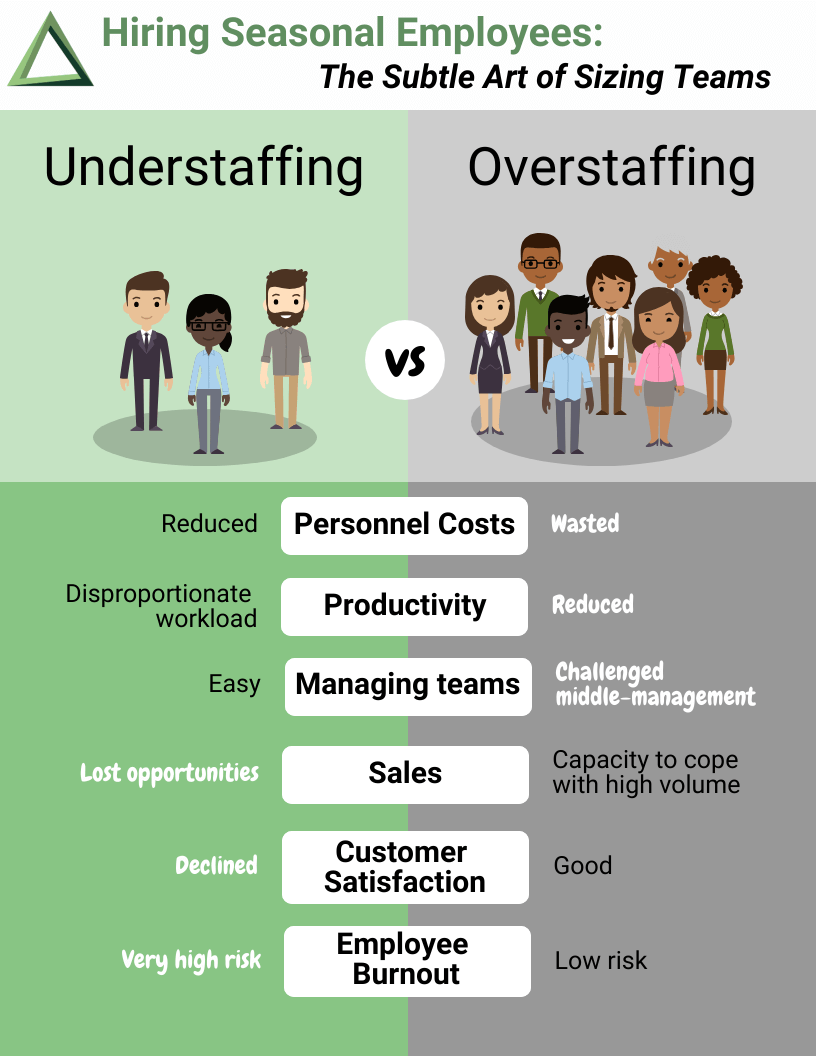Are you facing the ebb and flow of seasonal demands in your business? You’re not alone in dealing with seasonal fluctuations that are both a blessing and a challenge. The challenge of hiring seasonal employees is a crucial puzzle in the grand strategy of business scalability and adaptability. Amidst this intricate landscape, calling on a recruitment agency can be the solution.

By the end of this article, you’ll have a comprehensive understanding of how to strategically forecast, plan collaboratively, and implement flexible employment models. Moreover, we’ll guide you through streamlined onboarding processes and share retention strategies that work beyond the season.
So, let’s embark on this journey together, navigating the challenges of hiring seasonal employees. Your outcome? A more agile, efficient, and cost-effective HR department, ready to tackle the demands of any season.
The Unique Challenges of the Hiring Seasonal Employees
The Unpredictability of Seasonal Demands
Hiring seasonal employees brings with it an air of unpredictability. Companies must anticipate and prepare for fluctuations in demand, but precise predictions can be elusive. Whether it’s the surge in retail sales during Black Friday or the heightened demand for catering services during Ramadan, organizations often find themselves walking a tightrope between understaffing and overstaffing. Businesses must quickly scale their workforce during peak seasons and downsize when demand recedes. This fluctuation can be logistically complex.
Seasonal demands result from dynamic shifts in customer behavior that are often challenging to predict. Customer preferences and shopping patterns can vary yearly, making it challenging for businesses to anticipate demand accurately. External factors, such as economic conditions, weather, and unforeseen events (e.g., a pandemic), can influence seasonal demand. These factors are beyond a company’s control and can lead to sudden spikes or drops in demand.
Avoiding Overstaffing and Understaffing
The challenge of balancing the number of employees hired during peak seasons is delicate. Companies must strike the right balance to avoid the pitfalls of overstaffing and understaffing.
A data-driven, flexible, and agile approach is crucial for managing staffing levels effectively during these peak periods. It’s about ensuring that the workforce is aligned with the ebb and flow of customer demand to optimize service quality and cost-efficiency.

Risks of Overstaffing
- Wasted Costs: Hiring too many employees during peak seasons can lead to higher labor costs. Companies end up paying for excess labor that they should utilize more effectively.
- Lack of Productivity: Overstaffed teams can lead to idle employees, reducing productivity and demotivating the workforce.
- Management Challenges: Managing a surplus of employees can be challenging. Providing meaningful work and supervision for everyone takes time and effort, leading to inefficiencies.
Outcomes of Understaffing
- Customer Dissatisfaction: On the other hand, hiring too few employees can lead to longer customer wait times, slower service, quality degradation, and a decline in customer satisfaction.
- Lost Sales Opportunities: Understaffing during peak seasons can mean businesses miss out on potential sales opportunities. Customers may leave without purchasing due to long queues or unavailability of assistance.
- Employee Burnout: Existing employees might need additional responsibilities, which can lead to burnout and decreased morale.
Retaining Talent Post-Season
Seasonal hiring provides a unique opportunity for employers to assess a large pool of potential employees without committing to a long-term employment contract. By closely monitoring the performance and work ethic of these temporary workers, employers can identify individuals who have the potential to become valuable long-term employees. Seasonal hires can also bring fresh perspectives and new ideas to the workplace, benefiting the company beyond the peak season.
Companies must aim to align their recruitment strategies with their business goals. When hiring practices reflect your company’s values, you’re more likely to attract qualified candidates who fit your culture well.
Nevertheless, seasonal hires are temporary workers who may only intend to stay with the company during the peak season.

Seasonal work can sometimes create a mindset of high turnover, where employees and employers assume workers will leave once the season is over. This mindset perpetuates the problem of retaining talent because there’s no effort to engage and retain.
Seasonal employees often perceive limited opportunities for growth and career advancement within the company. They need to be made aware of potential long-term roles. This lack of visibility into future career paths can lead to talent attrition, particularly since they often experience overwhelming workloads during peak periods, leading to burnout and disengagement.
In companies with no structured plan for transitioning seasonal employees into permanent roles, these employees may feel underprepared to take on new responsibilities or even unattracted to remain in the company. Retaining top talent after the season ends requires careful planning. On the other hand, post-season, seasonal workers might receive offers from other employers that provide better compensation, benefits, or job security.
Retention Strategies Post-Season
1- Offer Clear Career Paths: Companies can improve retention by providing a transparent career path for seasonal employees. Let them know how they can progress within the organization and what opportunities exist for long-term employment.
2- Competitive Benefits: To retain top seasonal talent, offer competitive benefits, including healthcare, retirement plans, or educational assistance programs. Highlight these benefits during the seasonal hiring process.
3- Training and Upskilling: Invest in training and upskilling for seasonal workers who show potential. Offering them the chance to learn new skills or gain certifications can motivate them to stay with the company.
4- Performance Recognition: Recognize and reward high-performing seasonal employees. Acknowledging their contributions and providing performance-based bonuses can create loyalty.
5- Flexible Scheduling: Consider flexible scheduling options to accommodate seasonal workers’ other commitments or preferences. This flexibility can make long-term employment more appealing.
6- Regular Communication: Maintain open communication channels with seasonal employees post-season. Keep them informed about available opportunities and company updates.
7- Engagement Initiatives: Create engagement initiatives for returning seasonal employees to maintain their interest in the company. Recognize their value and commitment.
Onboarding and Training Constraints
Time constraints are a defining feature of seasonal hiring. Companies need to onboard and train new hires quickly, often sacrificing depth of instruction for streamlined methods.

Adequate training resources, including materials and personnel, may be strained during peak hiring seasons. Companies often need help to balance training current employees, preparing for increased traffic, and onboarding new hires, resulting in overworked trainers and poor sessions.
When companies need to rapidly onboard new employees, there is a risk of diluting the brand identity and service standards due to rushed or inconsistent training. Proper onboarding includes evaluation and feedback mechanisms. During peak seasons, allocating time for individual feedback and performance assessments can be demanding. Trainers might need help offering constructive feedback to new employees.
The Vital Role of A Recruitment Agency In Hiring Seasonal Employees
Seasonal hiring is a demanding task that calls for speed, efficiency, and access to a broad talent pool. Businesses must recognize the value of recruitment agencies in managing seasonal recruitment spikes. These partners are vital in optimizing hiring processes, expanding access to talent, and ensuring that companies can ride the waves of seasonal demand with agility and confidence and deliver exceptional service and customer satisfaction.

Let’s explore why companies should opt for seasoned recruitment agencies when facing the complexities of hiring seasonal employees. The answer lies in the array of benefits the recruitment agencies bring to the table:
- Speed and Efficiency
Recruitment agencies possess the necessary knowledge and resources to identify eligible candidates quickly. They maintain databases of qualified professionals and can expedite the hiring process. This speed is essential when companies face a sudden surge in hiring needs during peak seasons, like Ramadan or Black Friday.
- Access to a Broader Talent Pool
Experienced agencies maintain extensive databases of potential candidates. This access to a diverse and wide-ranging talent pool allows them to find individuals who fit specific job requirements quickly. When companies seek candidates with specific skills or qualifications, agencies can cast a wider net and locate the right fit for the job more effectively than companies conducting their hiring efforts.
- Expertise in Short-Term and Contract Hiring
Hiring seasonal employees often involves temporary or contract positions. Recruitment agencies specialize in these types of employment arrangements. They understand the nuances of short-term hiring, including contractual agreements and onboarding processes. This expertise streamlines the hiring of seasonal staff.
- Deep Market Understanding and Hiring Insights
Recruitment agencies deeply understand market dynamics, local job markets, and hiring trends. They can provide valuable insights into the availability of seasonal workers, anticipated salary ranges, and other market dynamics. This knowledge is essential for making informed hiring decisions.
- Proven Track Record
Experienced recruitment agencies have a track record of successfully managing recruitment spikes during peak seasons. They know how to source, vet, and onboard temporary staff efficiently. Their past successes are a testament to their ability to navigate seasonal hiring challenges and make them trustworthy partners.
- Transparent and Labor Law-Compliant Practices
Recruitment agencies are well-versed in labor laws and regulations. They ensure that hiring practices comply with legal requirements, reducing the risk of legal issues for the hiring company. They follow transparent and legal procedures and can reduce legal and compliance risks for companies.
- Cost Optimization
Hiring and training staff internally can be costly, from recruitment expenses to salaries, benefits, and training, especially for short-term positions. Recruitment agencies provide a cost-effective solution during peak seasons by finding suitable candidates quickly. They have the infrastructure for efficient hiring, reducing HR costs for their client companies.
- Flexibility
Recruitment agencies offer flexibility in staffing solutions. Each client has unique needs, and the service provider can customize their services to meet them. Whether a company need hiring seasonal workers or a large-scale recruitment effort, agencies can adapt.
- Risk Mitigation
Recruitment agencies can help mitigate the risks associated with seasonal hiring. They conduct thorough candidate assessments, reducing the likelihood of a bad hire. This risk reduction is essential during peak seasons when a misstep in hiring can have significant consequences.
- Quality Assurance
Experienced agencies are committed to maintaining quality in their candidate placements. They carefully screen applicants to ensure they meet the required qualifications and have the skills to excel in their roles.
Strategies for Hiring Seasonal Employees Successfully
While partnering with recruitment agencies is a significant step towards overcoming the challenges of hiring seasonal employees, companies should also adopt a strategic approach:

Forecasting
Use past data and sales projections to predict future hiring needs. The historical hiring patterns help you make informed decisions about the number and types of positions to fill.
To learn more about Business forecasting, we recommend the Operations Analytics Course from the University of Pennsylvania, which is free to access.
Collaborative Planning
Engage with the recruitment agency early in the process. Collaborative planning ensures a shared understanding of your hiring needs and helps the agency align its efforts with your business objectives.
Flexible Employment Models
The seasonal flux of business demands a workforce as dynamic as the market. A practical approach to manage this variability is through flexible employment models. These include temporary (temp-to-perm), part-time, and contract roles, each offering unique advantages for businesses looking to scale their teams in alignment with seasonal needs. Let’s focus on two pivotal solutions: staffing agencies and off-payroll services.
The Strategic Use of Staffing Services
Staffing services are a cornerstone of flexible employment, especially when dealing with the fluid demands of seasonal business. These agencies provide temporary workers quickly and efficiently, allowing companies to adjust their staffing levels in response to seasonal peaks and troughs. They handle workers’ recruitment, screening, and placement, ensuring that only qualified candidates are brought to your doorstep. Moreover, since the agency employs these workers, your business is spared from the administrative burden of benefits, taxes, and payroll.
The Benefits of Off-Payroll Services
Off-payroll services, often synonymous with contractor management, offer another layer of flexibility. By engaging workers on an off-payroll basis, businesses can enlist specialized skills for specific projects without the long-term commitment of a traditional employment relationship. This is particularly advantageous during seasonal spikes where you may require additional expertise or when scaling operations rapidly.
Why Choose A Staffing or Off-Payroll Model?
Opting for staffing agencies and off-payroll services allows you to:
- Respond Promptly: Scale your workforce up or down swiftly in response to business needs.
- Control Costs: Convert fixed labor costs into variable costs that align with your revenue.
- Focus on Core Functions: Free up your internal resources to concentrate on your business’s strategic growth rather than on time-consuming recruitment processes.
- Mitigate Risk: Reduce employment-related risks using staffing and employment law experts.
Conclusion
Incorporating staffing agencies and off-payroll services into your seasonal hiring strategy can lead to a more resilient and responsive business model. These flexible employment options allow you to confidently navigate the market’s seasonal shifts, ensuring that you have the right talent in place at the right time without the overhead of maintaining a sizeable permanent workforce.
Streamlined Onboarding
Develop quick and efficient onboarding and training methods. These should provide the necessary skills and knowledge while respecting the constraints of a shortened training timeline.
Retention Strategies
Offer incentives for top-performing seasonal hires to stay beyond the seasonal period. These incentives can range from retention bonuses to the promise of future employment.

A Real Business Case With NAOS Teams: Hiring Seasonal Employees For A Leading Telecommunication Company in Egypt.
Embark on a journey into the seamless orchestration of excellence with NAOS CX & NAOS Talents, where every detail of the seasonal ramp-up, especially during peak periods like Ramadan, unfolds like a carefully choreographed masterpiece.
A glimpse into this world, courtesy of Ms. Aya Khory, the maestro behind hiring seasonal employees for a leading telecommunications giant, reveals the artistry distinguishing NAOS from the ordinary.
The secret of the performance lay in the two words: Planning Ahead!
Three months before the Ramadan season, the client provides a carefully crafted plan that sets the stage for the process and provides the initial spark.

The departments represented by Ms. Aya (NAOS CX) and Mr. Sameh (NAOS Talents) cooperate to prepare batches and fulfill the required numbers. At the same time, the training team begins to carefully gather resources and trainers to meet the expected increase in demand.
Over time, recruiters take center stage and schedule the first interviews with three times the client’s required candidates. Then, the client conducts the second interview with the candidates, filtering them to choose the most qualified. The selected ones embark on a month-long training course by the NAOS Talents’ training team to level up their skills and develop their qualifications.
During the final assessment phase, the most competent agents demonstrate their skills in a role-playing game that serves to put them in real-life conditions. By simulating a real-life scenario likely to occur on the job, this stage prepares agents to meet any challenges.
The ones who pass take a golden ticket and align precisely with the client’s log-in count, and that is a testament to the precision of NAOS’s approach to overcoming the seasonal ramp-up challenges.
Conclusion
Peak seasons in the market bring opportunities as well as challenges for businesses. As the seasonal tides ebb and flow, companies embracing strategic recruitment partnerships will thrive in the ever-changing market currents. Hence, effectively navigating the challenges of hiring seasonal employees can be the key to success.
So, when the next surge in hiring seasonal employees hits, be ready—and let experienced recruitment agencies be your anchors of success.
Partnering with NAOS Talents as a leader and experienced recruitment agency is a strategic move towards tackling these challenges. With us, you will find more than just temporary solutions; you’ll discover a pathway to enriching your HR department while controlling costs. Our collaboration with leading brands and adherence to a transparent, labor law-compliant framework ensures you are in reliable hands.
Forming a Strategic Partnership with Recruitment Agencies can significantly enhance your seasonal hiring process, ensuring access to top talent and the flexibility needed to meet fluctuating demand.


One comment
Pingback: Staff Insourcing for In-House Contact Center | HRO Blog
Comments are closed.